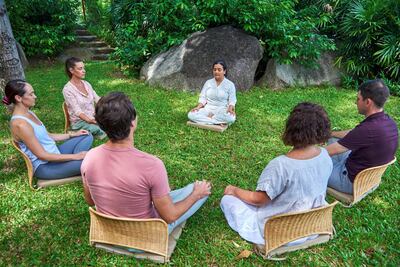An 80-year-old man checked in to Kamalaya, Koh Samui, a high-end spiritual wellness retreat where guests dip into detox sessions between palm-fringed beaches. But the man was there for one thing: to learn how to handle death.
"His wife had died and his two children had died," says Karina Stewart, its co-founder and chief wellness director. "His parents had died and his siblings had died. He was all alone in the world. He mentioned to us several times during his stay that if something were to happen to him, there would be no one for us to inform about his death."
Naturally, the topic of mortality came up repeatedly, and she says that, at Kamalaya, that was 100 per cent OK. It comes as part of an emerging wellness trend: retreats that strive to be "death positive".
“Travellers want mental, spiritual or physical self-improvement, and these retreats offer the right holistic experience for those on the same journey,” says Paul Joseph, founder of wellness travel company Health and Fitness Travel, which recently announced death-positive retreats were one of the top trends to watch.
"We've seen a big increase in the past two years in clients booking retreats to overcome certain obstacles in their life such as grief, or various health concerns like cancer, obesity and ageing. We are an ageing population. More people are actively exploring [the concept of] death as part of a mentally healthy life, and a better death is becoming integral to the ideal of a well life." The aim is to help people work through dealing with a terminal illness, for example, learning the tools to handle what will inevitably be a difficult process – whether it's for themselves or a loved one. Part of the focus, says counselling psychologist Reem Shaheen, is to change the whole narrative around death and dying.
"Culturally and historically, death, although inevitable, was perceived as doom or darkness that should be avoided. This type of thinking made death depressing and anxiety provoking," says Shaheen, the director of Dubai's Be Psychology Centre for Emotional Wellbeing.
"What the death positive movement does is relieve some of that anxiety by encouraging individuals to embrace the inevitable with a positive attitude. It reminds them to live in the day, which is something that we lack in today's world. A huge component in the increase of mental illness today is the public's inability to live in the moment, embracing the day as it is."
Being prepared for the inevitable is always a good thing, says Farah Lodi, a Canadian-certified counsellor and owner of Moving Forward coaching in Dubai. "How we view things affects how we feel about them. So viewing something in a catastrophic way can activate resistance, fear, anxiety and depression. Viewing the same event in an adaptive way will help us feel calmer and adjust to that event." Death-positive therapy expands in several directions: handling the grief cycle, teaching someone to find meaning in death and more. The grief cycle, Lodi says, includes several distinct stages – anger, denial, bargaining, depression and acceptance – that are experienced differently by each person.
"Being prepared, even with a simple understanding of the process of grief, can help buffer people from feeling helpless. Anticipating a certain stage of the grief cycle can make you feel more in control and more resilient, and more compassionate with yourself."
Grief is one of the most cataclysmic things that can occur in someone's life, says Farah Dahabi, a clinical social worker and grief specialist at The LightHouse Arabia Centre for Wellbeing, which has a specialist grief centre in the UAE.
“Grief occurs before loss – this is known as anticipatory grief. It’s messy and misunderstood.”
A specialist grief counsellor can help equip someone with the tools to handle what's coming and to know what to expect, she says. "We live in a society that is afraid to talk about death and dying, but having a healthy awareness can actually bring a bittersweet presence and deep engagement in daily experiences."
Finding a meaning in death is also important, Lodi says. "Is there a spiritual meaning that you can contemplate on? Belief in an afterlife, and of death as part of a journey, makes it acceptable," she says. Otherwise, try looking at death in a purely biological way,- like a battery running out or a car finishing its fuel, she suggests. "That helps you accept it without fear or resistance."
By talking through death in psychotherapy sessions, it becomes less of an unknown. "Being open to discussing the idea of death and one's mortality makes it easier to accept and deal with in the future," Shaheen says. "You have to keep in mind that loss is part of life. We all constantly experience loss, [of] jobs, parents, friendships, roles and relationships. So counselling clients through the process is an integral part of psychotherapy."
Even as a death-positive movement is on the rise, experts note that it's critical not to force someone into happier emotions if they aren't 'feeling' it. Some people want and need to talk about death – some people don't.
“Forcing anyone against their will to look at this essential yet personal part of life seems inappropriate, and in a way perhaps also violent,” Stewart says. “Having witnessed and been part of both experiences, it seems to me that in the same way we live with respect for one another and the decision we each make about how to live our lives, respecting others’ wishes regarding their own death and dying process is also essential.”

A community or guide through this process can be immensely beneficial, Stewart says. "Seeking wisdom, clarity, guidance and insight into one of life's greatest mysteries is an integral step in the healing and recovery process."
For the 80-year-old man at Kamalaya, this meant being allowed to process his losses and share bits of his life over a week within a supportive group. When things were done, says Stewart, he left with more zest.
Ultimately, the death-positive movement is focused not only on life, but on how to better memorialise those we love and how to handle our ultimate end. "A death meditation isn't meant to be scary," Joseph says. "It's a way to become in the realm of acceptance, which in turn steers us towards living in the present – fully and wisely."



